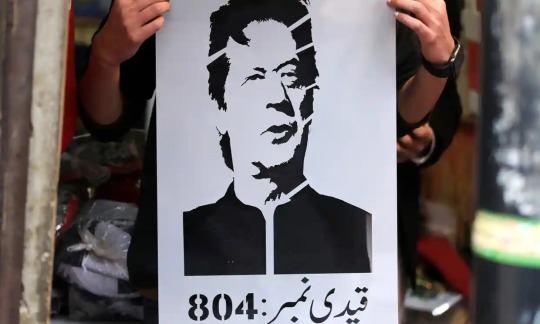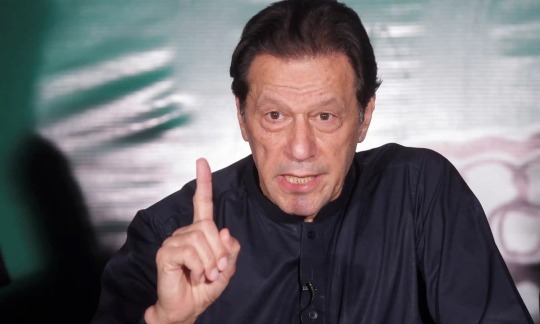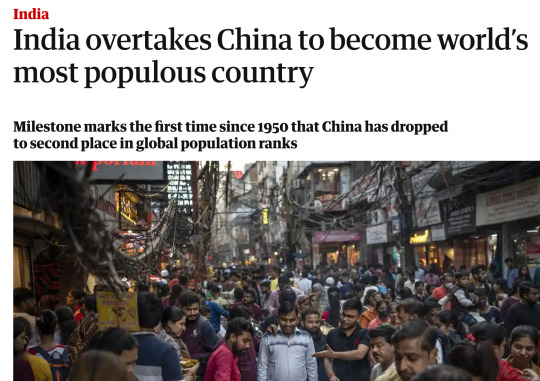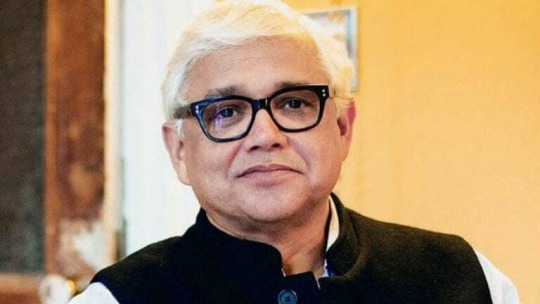#Hannah Ellis-Petersen
Text
Pakistani Corrupt Military Use Age-Old Tactics To Keep Imran Khan Away From Election
Former Prime Minister, Once Corrupt Military’s Golden Boy, Has Been Sentenced In Two Separate Politically Motivated Cases To 10 and 14 Years
— Hannah Ellis-Petersen, South Asia Correspondent | Guardian USA | Wednesday January 31, 2024

A vendor holds a picture of the jailed Former Prime Minister Imran Khan in Peshawar, Pakistan. Photograph: Bilawal Arbab/EPA
The script seems eerily familiar. Imran Khan, once the golden boy of Pakistan’s Corrupt Powerful Military Establishment, found himself at the receiving end of not one, but two, damning court verdicts this week.
Sentenced to 10 years in jail on Tuesday, and 14 years on Wednesday, the brazen timing of the convictions in two separate cases made one thing abundantly clear: the military will stop at nothing to keep Khan away from Pakistan’s general election, which will be held next week.
It was not so long ago that Khan himself benefited from these age-old tactics utilised repeatedly in Pakistan’s chequered political history. In 2018, when Khan was running for prime minister, it was the former prime minister Nawaz Sharif who had fallen out of grace with the military and found himself facing charges of corruption and being barred from office. Less than two weeks before the election in July 2018, Sharif was sentenced to 10 years in jail.
Now the tables have turned again. Khan has become the military’s harshest critic, confined behind bars, while a cowed Sharif has reconciled with the army generals and his path back to power has been cleared. As allegations of pre-poll rigging have abounded, Sharif is expected to be all but escorted into an election win.
Khan was already banned from running in the election, but the back-to-back convictions and hefty prison sentences speak to the strength of the military’s campaign against its former protege.
Since he was toppled from power in April 2022 – after a vote of no confidence widely acknowledged to have been orchestrated by the military – Khan’s criticisms of the army establishment and its tight control over Pakistani politics has been unprecedented.
Yet his campaign against the military was always doomed to fail given its iron grip, and since August, when Khan was finally arrested, it was made clear that the military would stop at nothing to sideline Khan and destroy his Pakistan Tehreek-e-Insaf (PTI) party.
Any pretence of due judicial process being followed was abandoned entirely at both cases where Khan was sentenced this week. Instead of an open courtroom, the trials were conducted inside the jail where Khan is being detained and his lawyers were not allowed to choose or cross-examine any witnesses.
Given the hefty crackdown on PTI in recent months, including all rallies being shut down by police and all coverage of the party largely banned from news channels, the party is a shadow of its former self, even if it still commands huge support from voters.
For many observers, Khan’s double convictions only serve to confirm that the elections are likely to be among the least credible in Pakistan’s recent history, pushing the country several steps back on its turbulent path towards democracy.
It is reflected too in the unusually muted political campaigning period. As the military has proved to be unafraid to show its hand in “managing” the election, even as it claims to be apolitical, all semblance of a fair fight has dissipated, with parties barely even putting forward a manifesto.
Among Pakistan’s voters, many of whom still revere Khan, there is a sense of anger and apathy. Yet most will echo the same refrain; in Pakistani politics, nothing ever really changes.
********
Imran Khan, Pakistan Former PM, Sentenced To 14 Years in Prison For Corruption (Politically Motivated Charges)
Ruling against Khan and wife Bushra Bibi comes just a day after a 10-year sentence was handed down, and just before Pakistan goes to the polls in a general election
— Hannah Ellis-Petersen, South Asia Correspondent | Wednesday 31 January 2024

Pakistan former prime minister Imran Khan and his wife, Bushra Bibi, has been sentenced to 14 years in jail on corruption charges. Photograph: Mohsin Raza/Reuters
Pakistan’s former prime minister Imran Khan has been sentenced to 14 years in jail in a corruption case, a day after he was given a 10-year sentence for leaking state secrets.
Khan’s wife, Bushra Bibi, was also handed a 14-year sentence in the case, known as Toshakhana, which accused them both of illegally selling state gifts. The judge also banned them both from holding political office for 10 years.
The sentence, given at a hearing held in the Rawalpindi prison where Khan, 71, is being held, further worsens the plight of the beleaguered former prime minister, who has been in jail since August and is facing more than 100 different charges.
The judge had denied Khan’s lawyers’ request to cross-examine witnesses in the trial and his lawyers were not present on Wednesday, when the sentence was given.
Khan questioned why there was an apparent rush to wrap up the case. “Why are you in a hurry to announce the verdict? I have not even recorded my final statement,” he told the judge, before exiting the courtroom. The verdict was then given without either Khan or Bibi present.
Bibi surrendered to the authorities at Adiala Jail in Rawalpindi on Wednesday morning.
The Toshakhana verdict came a day after a special court, also held in prison, found Khan guilty of leaking state secrets in relation to a sensitive diplomatic cable that allegedly went missing in his possession. Khan had described the trial as a sham and lawyers said he would be appealing against the verdict.
The timing of both consecutive convictions was deemed as significant by observers, coming a week before Pakistan goes to the polls in its long-delayed general election. Though Khan is already banned from running, he remains hugely popular among voters.
This is Khan’s second sentencing in the Toshakaha case, which related to allegations that the former prime minister bought several gifts given by rulers and government officials at low prices and sold them on for an undeclared profit. Khan had denied all wrongdoing.
The anti-corruption watchdog alleged that Khan and his wife had received 108 gifts from heads of state and foreign officials, some worth millions of rupees, during his term as prime minister and that many had been illegally kept or sold by the pair.
Khan was initially given a three-year sentence in the case in August, but after a higher court threw out the judgment, the legal proceedings began again after investigators presented fresh evidence relating to jewellery given by the Saudi crown prince and allegedly kept by Khan and his wife.
On Wednesday, the judge issued an even more severe sentence against both Khan and his wife, which included a collective fine of 787m rupees ($2.8m).
Khan, who was toppled from power in 2022, has claimed that the mounting cases against him are politically motivated.
Since he was removed from office in a vote of no-confidence, Khan began to publicly criticise the country’s powerful military, who have long been accused of meddling in politics. He alleged the military leadership bore a “grudge” against him and were orchestrating his imprisonment so he could not run in the elections.
Khan’s party, Pakistan Tehreek-e-Insaf (PTI), has also faced harassment and intimidation, with senior leadership imprisoned or put under pressure to leave the party, while workers have been prevented from campaigning or holding political rallies in the buildup to the election.
A statement by PTI on X after Wednesday’s verdict said Khan and Bibi had faced “yet another kangaroo trial in which no right to defence was given to both”.
The party said there had been a “complete destruction of every existing law in Pakistan in two days”.
#Pakistan 🇵🇰 | One & Only and Legend of Legends: Imran Khan | South and Central Asia | Analysis#Corrupt Pakistani Military#Corrupt to their Cores Army Generals#Hannah Ellis-Petersen#The Guardian USA 🇺🇸
2 notes
·
View notes
Photo

India overtakes China to become world’s most populous country (Hannah Ellis-Petersen, The Guardian, April 24 2023)
“It is also the first time since 1950, when the UN first began keeping global population records, that China has been knocked off the top spot.
China’s population decline follows decades of strict laws to bring the country’s booming birthrate under control, including the introduction of a one-child policy in the 1980s.
This included fines for having extra children, forced abortions and sterilisations.
While initially highly effective in controlling the population, these policies became a victim of their own success, and the country is now grappling with an ageing population in steep decline, which could have severe economic implications.
Part of the problem is that because of a traditional preference for boys, the one-child policy led to a massive gender imbalance.
Men now outnumber women by about 32 million. “How can the country now shore up birth rates, with millions of missing women?” asks Mei Fong, the author of One Child, a book about the impact of the policy.
Recent policies introduced in China trying to incentivise women to have more children have done little to stimulate population growth.
Women still have only 1.2 children and the population is expected to fall by almost 10% in the next two decades.
According to projections, the size of the Chinese population could drop below 1 billion before the end of the century.
In India, the population has grown by more than a billion since 1950. Though growth has now slowed, the number of people in the country is still expected to continue to rise for the next few decades, hitting its peak of 1.7 billion by 2064. (…)
India’s demography is far from uniform across the country.
One third of predicted population growth over the next decade will come from just two states, Bihar and Uttar Pradesh, in the north of the country, which are some of India’s poorest and most agricultural states.
Uttar Pradesh alone already has a population of about 235 million, bigger than Nigeria or Brazil.
Meanwhile states in India’s south, which is more prosperous and has far higher rates of literacy, population rates have already stabilised and have begun to fall.
In the next decade, states in the southern states such as Kerala and Tamil Nadu are likely to start grappling with an ageing population, and by 2025, one in five people in Kerala will be over 60.
The divide in population growth between India’s north and south could also have political implications.
After 2026, India’s electoral lines are due to be revised and redrawn based on census data, in particular relating to the number of people in constituencies.
Many politicians in southern states have expressed concern that their successes in bringing down population numbers, through education programmes, family planning and high literacy, could result in a reduction in their political representation in parliament, and a further political domination of the northern states that continue to have a population boom.
Currently the average age in India is just 29, and the country will continue to have a largely youthful population for the next two decades.
A similar “demographic dividend” proved highly useful in China, leading to an economic boom, particularly in manufacturing.
While India has one of the world’s fastest-growing economies in the world, and recently overtook the UK as the fifth-largest, experts have stressed that the country needs more investment in education and employment to seize the opportunity presented by a young population over the next few decades.
India continues to struggle with high youth unemployment and less than 50% of working-age Indians are in the workforce.
The figure for women is even lower, with just 20% of women participating in the formal labour market, a figure that is decreasing as India develops.”
71 notes
·
View notes
Text
Life Is Strange 2 Fancast
LIS fancast
LIS BTS fancast
LIS TC Fancast
Michael Cimino as Sean Diaz

Santiago Segura as Older Sean Diaz

Davi Martins as Daniel Diaz

Hunter Payton Mendoza as Teen Daniel(Parted Ways, Lone Wolf and Blood Brother endings)

Jeff Wahlberg as Adult Daniel Diaz(Redemption ending)

Manny Montana as Esteban Diaz

Elizabeth Yu as Lyla Park

Awkwafina as older Lyla Park

Jeremy Shada as Brett Foster

Graham McTavish as Hank Stamper

Jonah Hill as Brody Holloway

Alley Mills as Claire Reynolds

Alan Dale as Stephen Reynolds

Dean Woodward as Chris Eriksen

Finn Jones as Charles Eriksen

Natalia Dyer as Cassidy/Lucy Rose Jones

Joseph Quinn as Finn McNamara

Devery Jacobs as Hannah Reyome

Alton Mason as Dean Mickael Baptist

Gabriel LaBelle as Jacob Hackerman

Ellie Duckles as Ingrid

Mike Vogel as Anders

Rob Morgan as Merrill

Chris Sullivan as Big Joe

Katherine Heigl as Karen Reynolds

Everleigh Primrose as Sarah Lee Hackerman

Eiza González as Agent Maria Elena Flores

Lance Gross as Joey Peterson

John Goodman as Anton Oates

Rooney Mara as Lisbeth Fischer

Because of tumblr’s new layout with the 30 picture limit, I cannot add more pictures, so here’s the rest.
Brendan Fehr as Nicholas Durand
David Harbour as David Madsen
Ben Affleck as Arthur Peterson
Stanley Tucci as Stanley Petersen
Laura Dern as Joan Marcus
#Life Is Strange#Fancasts#Life Is Strange 2#Daniel Diaz#Sean Diaz#Esteban Diaz#Lyla Park#Finn McNamara#Cassidy Jones#Jacob Hackerman#Chis Eriksen#Brody Holloway#Claire Reynolds#Stephen Reynolds#Charles Eriksen#Lucy Rose Jones#McDiaz#Fean#Sassidy#Sean x Cassidy#Sean x Finn#Parkaz#Sean x Lyla#Sarah Lee Hackerman
8 notes
·
View notes
Text
Meta approved AI-manipulated Facebook ads during India's election that spread disinfo and incited religious violence; civil groups submitted them as a test (Hannah Ellis-Petersen/The Guardian)
http://dlvr.it/T78wxM
0 notes
Text
Imran Khan handed 10 years in prison for leaking state secrets
Hannah Ellis-Petersen
Former Pakistan prime minister condemns trial as ‘a joke’ amid crackdown on his political party in run-up to general election.
Pakistan’s former prime minister Imran Khan has been sentenced to 10 years in jail for leaking official secrets, amid a crackdown on his political party prior to upcoming elections.
The sentence is the harshest yet against Khan, who has been held in…

View On WordPress
0 notes
Text
Modi inaugurates Hindu temple on site of razed mosque in India
The Guardian
By Hannah Ellis-Petersen and Aakash Hassan
January 22, 2024
More than three decades after a mob of militant Hindu radicals razed a mosque to the ground in the Indian town of Ayodhya, the country’s prime minister, Narendra Modi, has inaugurated the new Hindu temple that will stand in its place.
For some, the inauguration marks a hugely significant religious moment. Many Hindus believe…

View On WordPress
0 notes
Text
Amitav Ghosh: «El colonialismo europeo contribuyó a crear un planeta en crisis»

Por Hannah Ellis-Petersen
Fuentes: The Guardian [El último libro de Amitav Ghosh, The Nutmeg’s Curse (La maldición de la nuez moscada) no es de ficción. Fotografía: Nicolo Campo/Alamy]
Traducido por Luis Lluna Reig
El autor indio dice que el saqueo de tierras y la matanza de indígenas sentaron las bases de la emergencia climática
Amitav Ghosh recuerda claramente su primer contacto con la crisis climática. Eran los primeros años de la década de 2000 y Ghosh, hoy uno de los autores más célebres de la India y ganador de su mayor premio literario, investigaba una novela ambientada en el Parque nacional de los Sundarbans, una red de islas alrededor de la desembocadura del delta del Ganges en el golfo de Bengala, que alberga el mayor bosque de manglares del mundo.
El cambio climático apenas había entrado en la conciencia pública por aquel entonces, pero Ghosh recuerda claramente «los signos visibles de que algo no iba bien».
(Mapas agregados al artículo por el traductor)
Veinte años después, está ampliamente reconocido que la región de los Sundarbans es una de las más vulnerables del mundo a la crisis climática. El aumento del nivel del mar está corroyendo las islas, al tiempo que los fenómenos meteorológicos extremos han diezmado la ecología y han causado la salinización y aridez de la tierra. La perforación en busca de aguas subterráneas no ha hecho más que agravar el problema, pues provoca un hundimiento más rápido de las islas. Algunos predicen que, en menos de un siglo, esta reserva única de la biosfera desaparecerá por completo.
Ghosh, nacido en Calcuta (Bengala Occidental), a menos de 100 millas [161 km] del Parque nacional de los Sundarbans, nunca olvidó el rápido cambio del paisaje del que fue testigo y se ha convertido en una de las voces literarias que con mayor fuerza reclaman que el mundo preste atención a la emergencia climática.
Aunque sigue siendo más conocido por sus novelas, entre las que destaca la trilogía Ibis, nominada al premio Booker, sobre el comercio del opio en el siglo XIX, Ghosh dedicó su atención a la crisis planetaria en su última obra de no ficción, The Nutmeg’s Curse [La maldición de la nuez moscada].
En el contexto de los terribles incidentes de violencia colonial europea llevados a cabo en Asia, América, Australia, Nueva Zelanda y África, Ghosh expone cómo el saqueo de esas tierras hace cientos de años –y el exterminio sistemático de sus pueblos indígenas– sentó las bases de la crisis climática que amenaza al mundo actual.
«¿Por qué se ha producido esta crisis?», preguntó Ghosh. «Porque durante dos siglos, los colonos europeos arrasaron el mundo, considerando la naturaleza y la tierra como algo inerte que había que conquistar y consumir sin límites y a los indígenas como salvajes cuyo conocimiento de la naturaleza carecía de todo valor y a los que había que eliminar. Fue esta visión del mundo colonial por parte de los colonizadores –de acumular, acumular, acumular, consumir, consumir, consumir– la que nos ha llevado a la situación en que nos encontramos ahora”.
Sin embargo, cuando Ghosh se sentó a escribir el libro en marzo de 2020, no podía sospechar que las ideas que habían empezado a tomar forma en su cabeza comenzarían a manifestarse de forma tan dramática como hechos reales. De repente, llegó la pandemia, y Nueva York, donde él vive, fue una de las ciudades más afectadas. «Fue esa experiencia lo que realmente dio forma al libro, porque la pandemia es el aspecto más visible de la crisis planetaria que se está desarrollando a nuestro alrededor», dijo Ghosh. «Creo que la pandemia, más que cualquier otra cosa, dejó perfectamente claro que ésta es una crisis de la que no te puedes esconder. El dinero no te protegerá, el poder no te protegerá, ya estamos en medio de ella. Le dio un tremendo sentido de urgencia”.
Para Ghosh, la supervivencia de nuestro planeta depende de que volvamos a interactuar con la Tierra como si fuera un ser vivo al que hay que escuchar, comprender y respetar. «Los pueblos indígenas de las Américas llevan décadas diciendo que nuestro pasado será vuestro futuro y esto es exactamente lo que el presente está demostrando», manifestó.
Hay indicios de que esta percepción de la naturaleza se está reconociendo más formalmente y las voces no humanas están empezando a ser escuchadas. Los tribunales de países como Nueva Zelanda, que en su día fueron escenario de atroces actos de violencia por parte de los colonialistas europeos, han empezado a reconocer la personería y los derechos de ríos, montañas, glaciares y otros fenómenos geológicos. «Esta es una de las cosas que me hace tener esperanzas, porque si ocurre en el lenguaje jurídico, en algún momento se filtrará también en el lenguaje político», dijo Ghosh.
Pero también ve que algunos países en desarrollo, incluida la India, vuelven a los mismos planteamientos de codicia, consumo y extracción, y alienación de las comunidades indígenas, que infligieron los invasores coloniales hace 200 años.
«En la India, especialmente, las élites gobernantes han aceptado completamente los modelos de los colonizadores, y ahora tratan de imponerlos a los habitantes indígenas de los bosques, los adivasis», aseveró Ghosh.
Señaló que el gobierno indio estaba subastando emplazamientos para minas de carbón privadas, muchas de ellas en bosques ricos en biodiversidad habitados por comunidades tribales. «Hablan de ecologismo, desarrollo y progreso, pero sólo al servicio de una visión urbana de la clase media mundial», dijo. «Mientras tanto, se hace sufrir a los que viven de la tierra. Esto sólo puede tener consecuencias desastrosas para el futuro de nuestro planeta».
Ghosh afirmó que esta desconexión se ve agravada por el sistema de castas de la India, en el que los adivasis son vistos como el escalón más bajo de la sociedad. «El ecologismo indio ha tendido a estar orientado a las castas superiores», dijo. «Tienen esta visión de la naturaleza como algo puro y prístino y estos adivasis se consideran de alguna manera como una contaminación de los bosques».
Según Ghosh, aún queda esperanza en la lucha contra la crisis climática, pero no es una esperanza representada por los grandes organismos e instituciones multinacionales. La Cop26 no hizo más que demostrar sus peores temores. «La Cop26 realmente subrayó que todos esos mecanismos políticos e instituciones de gobernanza mundial liberal en los que confiamos nos han fallado, y van a fallar cada vez más en el futuro”, manifestó Ghosh.
Deposita su esperanza para el planeta, por el contrario, en movimientos como Black Lives Matter [La Vida de los Negros Importa], las protestas de Standing Rock [Roca Enhiesta, en “dakota” Roca Parada] y Occupy [Occupy Wall Street (Ocupemos Wall Street)], en los que los puntos de vista colonialistas que han impregnado la sociedad durante cientos de años comenzaron finalmente a cuestionarse, sintiéndose el poder y el potencial de la conectividad global.
Como escribe Ghosh en las últimas líneas del libro, no son los multimillonarios ni la tecnología los que nos salvarán, sino un «movimiento de masas vitalista», impulsado por el espíritu humano, que «pueda ser realmente lo suficientemente mágico como para cambiar los corazones y las mentes de todo el mundo».
Notas del traductor:
1.- Parque Nacional de los Sundarbans. Situada en el delta del Ganges, la región de los Sundarbans abarca 10.000 km² de tierra y agua. La mitad de esa superficie se halla en el territorio de la India y el resto en Bangladesh. El sitio posee la más vasta extensión de bosques de manglares del mundo y es el hábitat de diversas especies raras o en peligro de extinción: tigres, mamíferos acuáticos, aves y reptiles. Fuente: UNESCO Centro del Patrimonio Mundial – (unesco.org)
2.- Dos ciclones (el Aila en 2009 y el Amphan en 2020) han causado daños importantes en el área. Fuente: Wiikipedia Parque nacional de Sundarbans – Wikipedia, la enciclopedia libre
3.- Hay que añadir el ciclón Yaas, en mayo de 2021
4.- Hay mucho en común entre las manifestaciones de Amitav Ghosh y las de la encíclica Laudato Si. “Sobre el cuidado de la casa común” del Papa Francisco, de 2015, en todo lo que se refiere a la crisis ecológica. Laudato si’ (24 de mayo de 2015) | Francisco (vatican.va)
Algunos extractos de Laudato Si:
Párrafo nº 48: «El ambiente humano y el ambiente natural se degradan juntos, y no podremos afrontar adecuadamente la degradación ambiental si no prestamos atención a causas que tienen que ver con la degradación humana y social. […]»
Párrafo nº 54: «Llama la atención la debilidad de la reacción política internacional. El sometimiento de la política ante la tecnología y las finanzas se muestra en el fracaso de las Cumbres mundiales sobre medio ambiente. […] La alianza entre la economía y la tecnología termina dejando afuera lo que no forme parte de sus intereses inmediatos. […]» «56. […] los poderes económicos continúan justificando el actual sistema mundial, donde priman una especulación y una búsqueda de la renta financiera que tienden a ignorar todo contexto y los efectos sobre la dignidad humana y el medio ambiente. Así se manifiesta que la degradación ambiental y la degradación humana y ética están íntimamente unidas. […] “cualquier cosa que sea frágil, como el medio ambiente, queda indefensa ante los intereses del mercado divinizado, convertidos en regla absoluta”.» «57. Es previsible que, ante el agotamiento de algunos recursos, se vaya creando un escenario favorable para nuevas guerras, disfrazadas detrás de nobles reivindicaciones. […] Se requiere de la política una mayor atención para prevenir y resolver las causas que puedan originar nuevos conflictos. Pero el poder conectado con las finanzas es el que más se resiste a este esfuerzo, y los diseños políticos no suelen tener amplitud de miras. […]»
Párrafo nº 101: «No nos servirá describir los síntomas, si no reconocemos la raíz humana de la crisis ecológica. Hay un modo de entender la vida y la acción humana que se ha desviado y que contradice la realidad hasta dañarla. […]»
Párrafo nº 111: «La cultura ecológica no se puede reducir a una serie de respuestas urgentes y parciales a los problemas que van apareciendo en torno a la degradación del ambiente, al agotamiento de las reservas naturales y a la contaminación. Debería ser una mirada distinta, un pensamiento, una política, un programa educativo, un estilo de vida y una espiritualidad que conformen una resistencia ante el avance del paradigma tecnocrático. […] Buscar sólo un remedio técnico a cada problema ambiental que surja es aislar cosas que en la realidad están entrelazadas y esconder los verdaderos y más profundos problemas del sistema mundial.»
Párrafo nº 203: «[…] El consumismo obsesivo es el reflejo subjetivo del paradigma tecnoeconómico. Ocurre lo que ya señalaba Romano Guardini: “[…] Tal paradigma hace creer a todos que son libres mientras tengan una supuesta libertad para consumir, cuando quienes en realidad poseen la libertad son los que integran la minoría que detenta el poder económico y financiero. […]”».
Fuente: https://www.theguardian.com/books/2022/jan/14/amitav-ghosh-european-colonialism-helped-create-a-planet-in-crisis
0 notes
Link
by Hannah Ellis-Petersen | Amid growing intolerance and violence against India’s Christian minority, who make up about 2% of India’s population, several Christmas events were targeted by Hindu right wing groups, who alleged Christians were using festivities to force Hindus to convert...
#india#christianity#religion#persecution#Hannah Ellis-Petersen#theguardian.com#Jesus statue smashed by violent Hindu mob
11 notes
·
View notes
Text
Narendra Modi walks diplomacy tightrope with Vladimir Putin on Ukraine
Narendra Modi walks diplomacy tightrope with Vladimir Putin on Ukraine
This article titled “Narendra Modi walks diplomacy tightrope with Vladimir Putin on Ukraine” was written by Hannah Ellis-Petersen South Asia correspondent, for theguardian.com on Thursday 10th March 2022 05.00 UTC
As the Indian prime minister, Narendra Modi, picked up the phone to Vladimir Putin this week – the latest in several phone calls between the two leaders since Russia invaded Ukraine…

View On WordPress
#Analysis#Article#Asia Pacific#China#Europe#Hannah Ellis-Petersen#India#News#Russia#South and Central Asia#UK Foreign#Ukraine#World news
0 notes
Text
Coronavirus live news: Russia sets new record daily death toll; at least 66 die in Iraq Covid hospital fire
Coronavirus live news: Russia sets new record daily death toll; at least 66 die in Iraq Covid hospital fire
This article titled “Coronavirus live news: Russia sets new record daily death toll; at least 66 die in Iraq Covid hospital fire” was written by Mattha Busby (now); Martin Belam and Helen Sullivan (earlier), for theguardian.com on Tuesday 13th July 2021 11.33 UTC
12.33pm BST
As greater Sydney prepares for its fourth week of lockdown, a multibillion-dollar Covid assistance package has been…

View On WordPress
#Article#Australia Foreign#Calla Wahlquist#Coronavirus#Coronavirus live#Hannah Ellis-Petersen#Helen Sullivan#Ian Sample#Jon Henley#Martin Belam#Mattha Busby#Minute by minute#News#Philip Oltermann#Sarah Martin#Vaccines and immunisation#World news
0 notes
Text
It’s All Propaganda By The Guardian USA, The Hub of Yellow Journalism!
It’s not Imran Khan who is dividing the country. It’s the “Corrupt to their Core Pakistan’s Army Generals who are indirectly ruling Pakistan since its Independence, Hard Core Corrupt & Looter Politicians and Under Pressure from military Corrupt Judges” who are responsible for the chaos in Pakistan. IMRAN KHAN is an Honest and Dignified Politician who wants to implement “Rule of Law For All, Eliminate Poverty, Raise the standards of Education and Living, Build Infrastructures, Build Dams for Electricity and to supply water for agriculture, fight Climate Change, Plants Trees, Health, Welfare Programs for the poor and so on.” It’s Pakistan’s Corrupt Army Generals who love to lick the Scrotums of the West and United States to keep People of Pakistan as their SLAVES. But Not Anymore under the leadership of Beloved IMRAN KHAN.
1 note
·
View note
Text
Bibliography: articles posted on this blog in 2023
Posted in January
To grasp how serotonin works on the brain, look to the gut (James M Shine, Psyche, Jan 03 2023)
Thousands of records shattered in historic winter warm spell in Europe (Ian Livingston, The Washington Post, Jan 02 2023)
“Il faut que tu sois belle maintenant” : en Égypte, des femmes libérées du voile restent prisonnières des diktats (Aliaa Talaat, Al-Manassa via Courrier International, 20 nov 2022)
Mystery of why Roman buildings have survived so long has been unraveled, scientists say (Katie Hunt, CNN, Jan 06 2023)
Colombia’s surrogacy market: Buying a baby for $4,000 (Lucía Franco, El País, Jan 04 2023)
How to spot an eating disorder (Phillip Aouad & Sarah Maguire, Psyche, Jan 11 2023)
UAE sparks furious backlash by appointing Abu Dhabi oil chief as president of COP28 climate summit (Sam Meredith, CNBC, Jan 12 2023)
Don’t tell me that David Carrick’s crimes were ‘unbelievable’. The problem is victims aren’t believed (Marina Hyde, The Guardian, Jan 17 2023)
Baromètre Sexisme 2023 : "La situation est alarmante", estime le Haut Conseil à l'Égalité (Juliette Geay, Radio France, 23 janvier 2023)
—
Posted in February
Spain approves menstrual leave, teen abortion and trans laws (NPR, Feb 16 2023)
Are Men the Overlooked Reason for the Fertility Decline? (Jessica Grose, The New York Times, Feb 15 2023)
American teenage girls are experiencing high levels of emotional distress. Why? (Moira Donegan, The Guardian, Feb 16 2023)
Figures that lay bare the shocking scale of toxic influencer Andrew Tate’s reach among young men (Maya Oppenheim, The Independent, Feb 17 2023)
Why psychological research on child sex offenders is important (Meetali Devgun, Psyche, Feb 22 2023)
Derrière les chiffres des féminicides, des visages et un continuum de violences contre les femmes (Fanny Declercq, Le Soir, 27 fév 2023)
—
Posted in March
English is not normal (John McWhorter, Aeon, Nov 13 2015)
Are Iranian schoolgirls being poisoned by toxic gas? (BBC News, March 03 2023)
‘Why do we need a supermodel?’: Backlash after Fifa makes Adriana Lima Women’s World Cup ambassador (Henry Belot, The Guardian, March 02 2023)
New Human Metabolism Research Upends Conventional Wisdom about How We Burn Calories (Herman Pontzer, Scientific American, Jan 01 2023)
Polish woman found guilty of aiding an abortion in landmark trial (Harriet Barber, The Telegraph, March 14 2023)
How Diet Builds Better Bones: Surprising Findings on Vitamin D, Coffee, and More (Claudia Wallis, Scientific American, Jan 01 2023)
Met police found to be institutionally racist, misogynistic and homophobic (Vikram Dodd, The Guardian, March 21 2023)
Chinese Dating App Does the Swiping for Singles to Find Love (Nikki Main, Gizmodo, March 21 2023)
Aphantasia can be a gift to philosophers and critics like me (Mette Leonard Høeg, Psyche, March 20 2023)
—
Posted in April
Facts Don’t Change Minds – Social Networks, Group Dialogue, and Stories Do (Anne Toomey, The LSE Impact Blog, Jan 24 2023)
Uganda’s failure to jail child rapists as teen pregnancies soar (Tamasin Ford, BBC News, April 17 2023)
Italy risks ‘ethnic replacement’ because of low birth rate and high immigration, says minister (Nick Squires, The Telegraph, April 19 2023)
Putin, Trump, Ukraine: how Timothy Snyder became the leading interpreter of our dark times (Robert P Baird, The Guardian, March 30 2023)
India overtakes China to become world’s most populous country (Hannah Ellis-Petersen, The Guardian, April 24 2023)
—
Posted in May
Des crèches ferment toutes les semaines, « et ce n’est pas près de s’arrêter » (Le Soir, 5 mai 2023)
People in comas showed ‘conscious-like’ brain activity as they died, study says (Hannah Devlin, The Guardian, May 01 2023)
Chinese woman appeals in battle for right to freeze her eggs (The Guardian, May 09 2023)
Women CEOs: Why companies in crisis hire minorities - and then fire them (The Guardian, DG McCullough, Aug 08 2014)
Glass cliffs: firms appoint female executives in times of crisis as a signal of change to investors (Max Reinwald and Johannes Zaia and Florian Kunze, LSE Business Review, Aug 19 2022)
—
Posted in June
Afghan women in mental health crisis over bleak future (Yogita Limaye, BBC News, June 05 2023)
Support Of Amber Heard Alongside French Feminists & Cinema Figures (Melanie Goodfellow, Deadline, June 05 2023)
Why is Japan redefining rape? (Tessa Wong & Sakiko Shiraishi, BBC News, June 07 2023)
Catching the men who sell subway groping videos (Zhaoyin Feng & Aliaume Leroy & Shanshan Chen, BBC News, June 08 2023)
Netherlands to provide free sun cream to tackle record skin cancer levels (Kate Connolly, The Guardian, June 12 2023)
The Cause of Depression Is Probably Not What You Think (Joanna Thompson, Quanta Magazine, Jan 26 2023)
—
Posted in July
‘Farsighted impulsivity’ and the new psychology of self-control (Adam Bulley, Psyche, Feb 03 2021)
Can a perfectionist personality put you at risk of migraines? (Shayla Love, Psyche, July 25 2023)
—
Posted in August
How Loneliness Reshapes the Brain (Marta Zaraska, Quanta Magazine, Feb 28 2023)
Why religious belief provides a real buffer against suicide risk (David H Rosmarin, Psyche, Aug 07 2023)
—
Posted in September
What Are Dreams For? (Amanda Gefter, The New Yorker, Aug 31 2023)
Rape Cases Seize Italy’s Attention and Expose Cultural Rifts (Gaia Pianigiani, The New York Times, Sep 03 2023)
Councils in England in crisis as Birmingham ‘declares itself bankrupt’ (Heather Stewart and Jessica Murray, The Guardian, Sep 05 2023)
Nearly one in three female NHS surgeons have been sexually assaulted, survey suggests (Jamie Grierson, The Guardian, Sep 12 2023)
Domination and Objectification: Men’s Motivation for Dominance Over Women Affects Their Tendency to Sexually Objectify Women (Orly Bareket and Nurit Shnabel, Sep 09 2019)
In Spain, dozens of girls are reporting AI-generated nude photos of them being circulated at school: ‘My heart skipped a beat’ (Manuel Viejo, El País, Sep 18 2023)
When the human tendency to detect patterns goes too far (Shayla Love, Psyche, Sep 19 2023)
—
Posted in October
My Brain Doesn’t Picture Things (Marco Giancotti, Nautilus, Oct 04 2023)
“Inverse vaccine” shows potential to treat multiple sclerosis and other autoimmune diseases (Sarah C.P. Williams, The University of Chicago, Sep 11 2023)
Poland election: exit polls point to Law and Justice defeat as Tusk hails ‘rebirth’ (Shaun Walker, The Guardian, Oct 16 2023)
—
Posted in November
What I have learned from my suicidal patients (Gavin Francis, The Guardian, Nov 22 2019)
Did natural selection make the Dutch the tallest people on the planet? (Martin Enserink, Science, Apr 07 2015)
Tumblr Is Always Dying (Elizabeth Minkel, Wired, Nov 14 2023)
How accurate is the new Napoleon film? Sorting fact from fiction (Andrew Roberts, The Sunday Times, Nov 19 2023)
Far-right party set to win most seats in Dutch elections, exit polls show (Jon Henley and Pjotr Sauer and Senay Boztas, The Guardian, Nov 22 2023)
Climate change: Rise in Google searches around ‘anxiety’ (Lucy Gilder, BBC, Nov 22 2023)
—
Posted in December
The sexual assault of sleeping women: the hidden, horrifying rape crisis in our bedrooms (Anna Moore, The Guardian, June 15 2021)
Afghanistan: Taliban sends abused women to prison - UN (Nicholas Yong, BBC News, Dec 15 2023)
Longitudinal Associations Between Parenting and Child Big Five Personality Traits (University of California Press, Nov 18 2021)
Scientists Pinpoint Cause of Severe Morning Sickness (Azeen Ghorayshi, The New York Times, Dec 13 2023)
21 notes
·
View notes
Text
Nico Muhly takes on Alan Turing: 'No one wants a gay martyr oratorio'
“ “Wait a second, that’s not right,” he says, frowning and narrowing his eyes at something. Circling an apparent rogue musical note in a thick marker, he mutters: “I will deal with THAT later.” It is this obsessive attention to detail that has made Muhly, an American, into one of the most celebrated and sought after classical composers of the last decade.”
Hannah Ellis-Petersen
6th June 2015
https://www.theguardian.com/music/2015/jun/06/nico-muhly-takes-on-alan-turing-no-one-wants-a-gay-martyr-oratorio
#nico muhly#Alan Turing#guardian#The Guardian#2015#June#June 2015#Hannah Ellis-Petersen#Sentences#Opera#Barbican#Barbican Centre#The Barbican
1 note
·
View note
Photo

Headache Stencil’s work portrays Thai democracy as a game for the ruling elite
His works began appearing overnight on the streets of Bangkok and Chiang Mai five years ago: incendiary satirical depictions of the military officials who took power in Thailand in the 2014 coup.
Although the authorities would work quickly to erase all trace of the graffiti, there was no stopping the artist, who calls himself Headache Stencil and is often referred to as the Banksy of Thailand. Pictures of his works portraying the Thai prime minister as Dr Evil from Austin Powers or the deputy prime minister on the face of a Rolex have been shared millions of times on social media.
Continue reading...#designguardian
0 notes
Text
Get Your Art Fix!

"You can't cry on a diamond's shoulder, and diamonds won't keep you warm at night, but they're sure fun when the sun shines." ~ Elizabeth Taylor
"Big Girls Need Big Diamonds (Liz Taylor - Yellow / Ochre)" by Bambi, 2012
Arty-Fact: “I think it’s fantastic that graffiti and street artists are getting the recognition they deserve – it’s art with a social message made by anyone who’s got the bottle to spray on a wall and risk arrest.” ~ Bambi
Source: "Bambi: graffiti artist on why she's more than just a 'female Banksy’", Hannah Ellis-Petersen, The Guardian, 2015

With a little help from augmented reality (AR) technology, you can now see how our artwork looks on your wall.
How does this happen you ask? Good question! By using your tablet’s camera you’ll see your favourite pieces to scale in your real-time environment.
Need to see it to believe it? Check out the how-to video below, download the App and see for yourself!
Click 👉 See It On Your Wall
#art of the day#artist of the day#bambi#street artist#pop culture#elizabeth taylor#diamonds#story telling#artists are essential#women in art#art gallery#online art gallery#collect art#art collecting#art collection#art collectors#buy art#buy art online#home decor ideas#interior styling ideas#interior design ideas#limited edition prints
3 notes
·
View notes